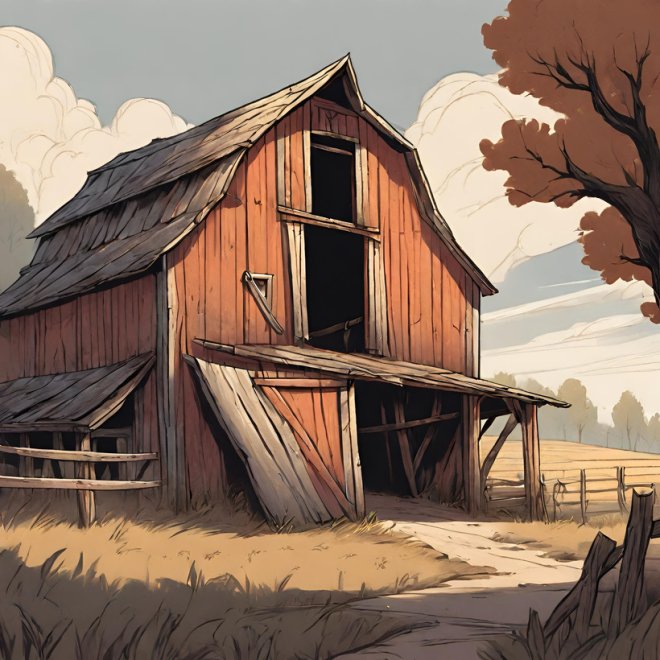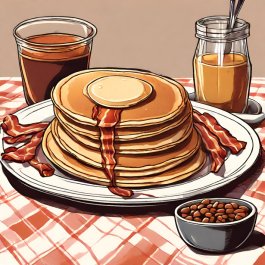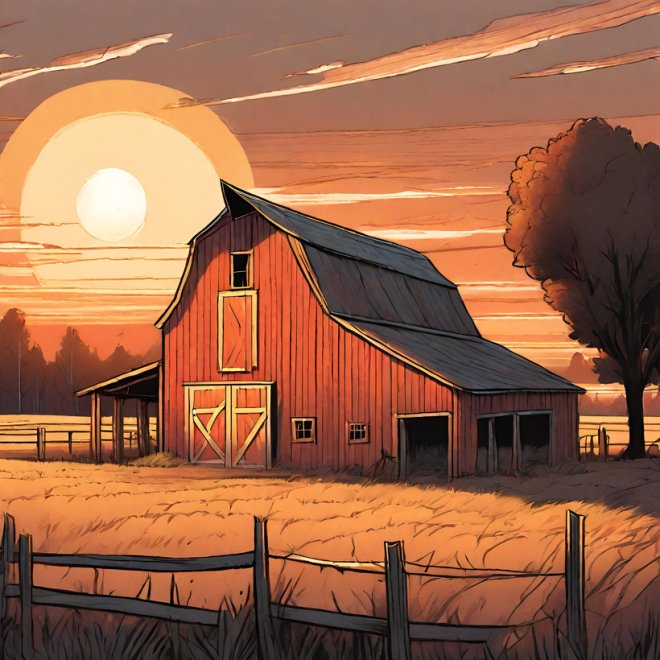Read by Michael Flamel

Once upon a time, in a quaint little village nestled in the rolling hills of the 1800s, there lived a group of hardworking folks who knew how to turn even the toughest of tasks into a barrel of laughs. It was a time when communities came together to help each other out, and nothing exemplified this spirit better than a good old-fashioned barn-raising.
Now, the folks in this village were as lively as a gaggle of geese on a summer’s day, and they decided it was high time to raise a new barn for Farmer Jenkins. The old barn had seen better days, and it was leaning to one side like a tipsy scarecrow on a windy night.
Word spread like wildfire through the village that the barn-raising was upon them. Folks came from far and wide, armed with their trusty tools, plenty of sweat, and an even greater abundance of good humor. The sun was shining, the birds were singing, and it seemed like even the wind whispered jokes as it rustled through the trees.

The day started with a hearty breakfast of flapjacks, beans, and bacon, enough to fuel an army of lumberjacks. Farmer Jenkins, with his bushy beard and a twinkle in his eye, stepped up to lead the festivities. He was the kind of man who laughed so heartily that even his chickens couldn’t help but chuckle.
As the work began, the mishaps started almost immediately. Tom, a strapping young lad, managed to hammer his thumb instead of the nails, and the air turned blue with laughter and colorful language. Sally, who was as sweet as honey but not as nimble, tripped over a loose plank, sending her sprawling into the hay. The barn was taking shape, but it seemed like chaos had taken the reins.
With each mishap, laughter erupted like fireworks. Farmer Jenkins’s infectious laughter set the tone, and soon, the whole lot of them were roaring with mirth. Every mistake became a new opportunity for a witty remark or a clever jest. They laughed until their sides hurt, and then they laughed some more.
The laughter didn’t just lighten the mood; it seemed to lighten the load itself. The heavy beams and stubborn nails seemed to dance to a merry tune, and even the stubbornest of stubborn mules decided to cooperate, perhaps enticed by the melodious chuckles that filled the air.
As the day wore on, the barn started to rise, its walls stretching toward the sky like a giant stretching after a long nap. And as the barn grew taller, so did the spirits of the workers. They joked, they sang, and they even had a contest to see who could tell the silliest story.

By the time the sun dipped below the horizon, the barn stood proud and tall, a testament to the hard work and laughter of the villagers. Farmer Jenkins stood before the crowd, tears of gratitude in his eyes, and thanked each and every one of them. But the true gift, he said, was the laughter that had echoed through the day.
The villagers departed with hearts full of joy, their faces aching from smiles, and their spirits lifted higher than the barn itself. They had learned a valuable lesson that day: that no matter how heavy the load or how tough the task, a hearty dose of laughter could make it all seem lighter.
From that day forward, the village became known for its barn-raisings and its infectious laughter. And they all lived happily ever after, knowing that in their little corner of the world, they had mastered the art of “Raising a Barn, Raising Spirits,” proving that laughter could truly lighten any load. ❖


 Previous
Previous

